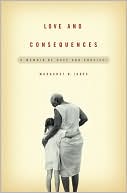Author admits gang-life 'memoir' was all fiction
Sister blew the whistle on writer who said she was a foster child in South L.A., but really grew up with her family in Sherman Oaks.
The author of "Love and Consequences," a critically acclaimed autobiography about growing up among gangbangers in South Los Angeles, acknowledged Monday that she made up everything in her just-published book.
"Jones" is actually Margaret Seltzer. Instead of being a half-white, half-Native American who grew up in a foster home and once sold drugs for the Bloods street gang, she is a white woman who was raised with her biological family in Sherman Oaks and graduated from Campbell Hall, an exclusive private school in the San Fernando Valley.
The reviewer told of how the book described "Jones" selling drugs at age 12 because she was "eager to earn my own money toward the flame-red Nike Cortez with fat laces that everyone else wore, but even more excited to prove myself worthy of wearing the affiliated color and moving up the ranks."


2 comments:
Using or impersonating a "Native American" identity, or "American Indian" identity as a victim's identity [in memoir] or as a badge of victimization is fairly common, -- and shameful. It's become a national pastime and so ingrained in minds of Americans that publishers will believe the craziest stories -- "my life as a poor American Indian child."
Of course, this is true of many stereotypes of people of color.
Concerning how to know whether some emerging writer is really an American Indian there are over 500 tribes [they know who their citizens are] and many Native American organizations such as Wordcraft Circle, Returning the Gift, to name only two, with long lists of Native writers. Or people who know young emerging native writer, writing memoir.
What's next? I was a poor American Indian in a previous life.
LeAnne Howe
The Education of Little Tree is probably the most famous fake memoir of an Indian child. See Educating About Little Tree for more information.
Post a Comment